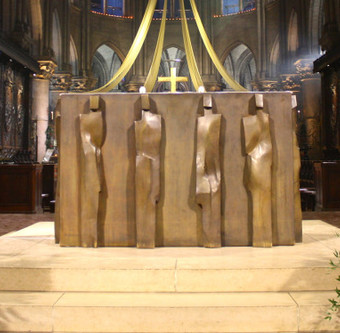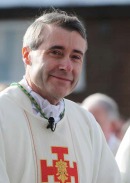
Faith and the Future
Editorial:
01.03.20
Faith and the future
Over to Mary
THE DECISION BY THE Bishops of England and Wales to renew the dedication of the country to Mary – following the original dedication by Richard II in the 14th century – taps into an important spiritual reserve. The Scottish Bishops similarly dedicated Scotland to Our Lady at the shrine of Carfin in 2017. And without ignoring that great nation, with its own heritage and noble story, we need to explore this English thing for a moment.
Running a bit low?
We use the word “reserve” in the sense that a reservoir holds water, or a good cellar a reserve of wine and food. A nation can have a reserve of spiritual strength, perhaps running a bit low – water can do that in a dry spell too – but still available for use. There is, among Catholics in Britain, a reserve of faith, a recognition of a rich heritage kept with great courage by martyrs and cherished down generations, that exists in a sort of collective family album. It is multi-racial, is not associated with nationalism and is not political. It does not seek to be integriste or to indulge in notions of a Church/State alliance that is associated with unhelpful examples abroad and a folk memory of bitter Reformation conflict at home. It is not even particularly nostalgic. It is more like a family album - perhaps one of those new on-line sort – muddled, but recognisable, with pages yet to be filled and new sections opened.
Bafflement
This spiritual reserve was opened up – and was also replenished by – the successful State Visit of Pope Benedict XVI in 2010, exactly a decade ago this year. There was goodwill and a cheerful neighbourly mood which - to the bafflement of the mass media in general and the BBC in particular – brought crowds into the streets to cheer the Pope and coachload after coachload to the Mass at Cofton Park for the beatification of John Henry Newman.
Newman – yes, he is an important part of this heritage. A very English saint in so many ways: Oxford, of course, and London up to a point, but more importantly also unfashionable Birmingham, and railway journeys, and humour, and a strong sense of justice. And, as a Catholic, being misunderstood, and regarded as marginal to national life until reality dawned and the public came to grasp the bigger picture. And attractive in an ecumenical spirit: we were touched by the moving message of HRH the Prince of Wales at Newman’s canonisation, revealing as it did a real knowledge of the saint, and a love of his beautiful poems and hymns.
Who we are
A first point to grasp about the Catholic community of England and Wales is what a mix we are. By far the biggest annual pilgrimage to Walsingham is that of the Tamils. Another large group is Caribbean. Many of our parishes, and our priests – notably in South London, for example – are African. There are large numbers of Filipinos among us. There are substantial numbers of Indian people, many from Kerala. There are a good many Poles – they have their own churches and parish structure dating from the years following WWII, but are present in plenty of other parishes too.
Saints
Newman is our newest saint, and he joins those whose names have become more and more familiar to Catholics in Britain since the canonisation of the Forty English and Welsh Martyrs by Paul VI in 1970. Here, too, there was a reclaiming of truth. How pleasing it is to note that many of our newer Catholic schools and colleges are named in their honour: St Edmund Campion, St John Payne, St Richard Reynolds, St Philip Howard, and the others are now familiar to Catholics and non-Catholics alike in the 21st century.
And more
We are not particularly tribal. Catholic events tend to have ecumenical guests, and there is a general and genial feeling that a common Christian witness is important and should be presented whenever feasible. We are uninterested in old polemics: there are new issues to tackle.
We are uncomfortably realistic about the state of the Church (revelations of sexual sins etc) and about falling Mass attendance and a shortage of clergy.
We know our Catholic schools are popular and successful, but also that many (most?) of the children and staff involved are not regular Massgoers.
We quite like sharing gloomy statistics and announcing solutions that reflect our varied personal opinions and loyalties.
Heritage
And now the Bishops of England and Wales unite us all again with all of this heritage: this March they will dedicate the country to Mary.
Who will be interested? Walsingham sees large Rosary processions each summer, notably with the New Dawn gathering and with Youth 2000. Thanks in part to St John Paul and the revival of the Rosary during his pontificate, Marian devotion is definitely a part of Catholic life in Britain in 2020 and cherished by many: anyone born since the 1990s grew up with the “new” Luminous Mysteries and with a knowledge of vast pilgrimages to Lourdes and Fatima. Travelling to Lourdes to help with the disabled pilgrims is almost a rite of passage for many young Catholics, and even if the chief memories are social rather than spiritual, indelible images remain of massive candlelit processions, affirmations of faith, solidarity with the suffering, the hugeness of a worldwide Church
That said, it seems unlikely that there will be massive crowds at the re-dedication events this March. This won’t be a rerun of a Papal visit. Nor will it be a media event, or one that impinges in any dramatic way on the national consciousness. But we can and should expect some spiritual fruits.
Mary
As we dedicate England and Wales to Mary we might think of things that we could ask of her. Hymns to Mary traditionally beg her, plead with her, for help, reminding her that she is a mother who cares for her children, and who intercedes for them. So FAITH magazine offers some suggestions for our readers to use in their prayers.
• We might first of all beg for courage –particularly for our bishops, tasked with leading us and directing us. And let’s be specific: courage to tackle instructions from official Government bodies obliging schools to adopt “relationships education” forcing children to listen to false and crude statements on sexual matters. We might ask for a clear and united statement from our Bishops announcing that Catholic schools will use only material that strictly conforms to Catholic teaching both in style
and in detail, centred on the Catechism of the Catholic Church.
• It’s March – season of spring and the traditional time for some house-cleaning and tidying up, work generally supervised by mothers. Might our household bureaucracy benefit from this? Some months back, the Catholic Education Service made a terrible mess of itself by adopting wholesale chunks of verbiage from a militant homosexual lobby group. We are overdue for a major tidy-out there.
• And let us beg for more and more men to respond generously to the call to the priesthood, for more religious sisters, for more Catholic teachers. And those requests should come with a sense of discomfort: in today’s culture making a firm commitment is not easy, and the call can quite easily be brushed aside as irritating.
• But not all prayers have to be announced publicly, and perhaps the most important will be those added from the depths of our hearts on matters of the heart. Mary as mother is particularly open to pleas for personal help – for Catholics seeking good spouses, for the lonely and the forgotten, for the many broken families…
Solemn
With this prayer-list ready, let us approach this solemn re-dedication of England with open hearts. Walsingham is a popular place of pilgrimage, and is central to our selfunderstanding as Catholics in our country. The destruction of the shrine under Henry VIII and its revival at the end of the 19th century is echoed in the whole story of Catholicism in Britain. And it’s a death-and-resurrection story which is rooted in the centrality of what we understand as Christians. That is why we dare to ask for a revival of the Faith in our land. That is why re-dedicating England to Mary is not some exercise in goodwill or a feel-good thing for people who like Marian hymns. As so often happens in the life of the Church, something offered with faith, hope and love will – perhaps after some testing and some challenges and difficulties – be fruitful and achieve more than we can imagine.
O Mary, conceived without sin, pray for us who have recourse to thee….





